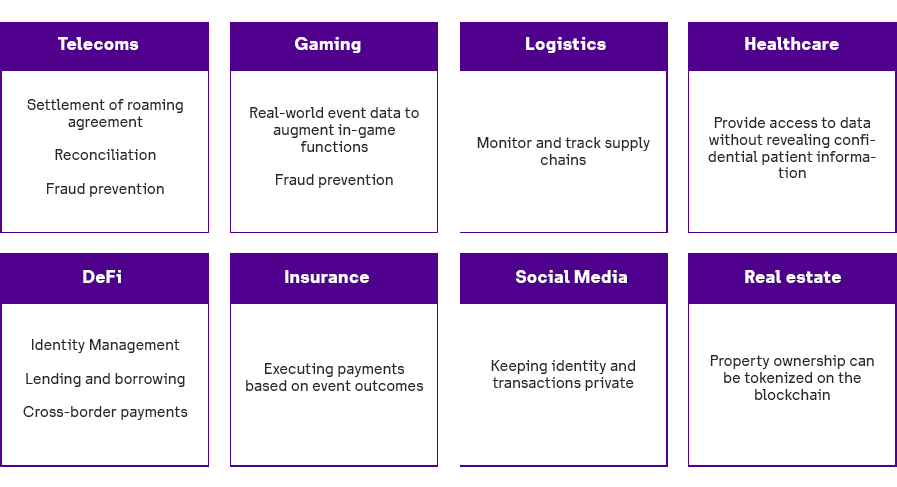
Web3 refers to a vision of the internet (based on blockchain technology) that is decentralized and user-centric. It represents a radical shift from the current Internet (Web2), which relies on centralized platforms and intermediaries.
For businesses, Web3 opens up global opportunities, innovative ecosystems, and novel business models. It introduces new revenue opportunities through tokenization, NFTs, and decentralized finance. Blockchain-based applications also unlock new ways to streamline and automate processes, saving time as well as costs.
Businesses leveraging Web3 technologies are well-placed to act on emerging opportunities in the GCC and beyond. And, early adopters gain a competitive edge, differentiating themselves in the market and staying ahead in the evolving landscape.
This article discusses how businesses across all industries – real estate, insurance, gaming, telecoms, supply chain and logistics, social media, DeFi, and more – can capitalize on Web3 infrastructure right here in Bahrain.
Table of Content
- How is Web3 different from Web2?
- Web3 use cases
- Benefits of Web3 technologies
- Challenges in implementing Web3
- The Future of Web3
- About stc Bahrain Web3 Offerings
How is Web3 different from Web2?
Web2 emphasizes user participation, interactivity, and the ability to create and share content. However, Web2 applications rely on centralized entities, lack transparency in data handling, and offer limited user control over data.
Web3 applications – in contrast to Web2 – are completely decentralized. They use blockchain technology to ensure privacy, security, and transparency of data and transactions through immutable blockchain records.
How Web3 works
Web3 combines a set of related technologies and protocols to build transparent, secure, and user-controlled digital ecosystems.
Blockchain
Blockchain is at the heart of any Web3 application. It refers to a decentralized, distributed ledger – or database – that securely records transactions, such as the transfer of cryptocurrency or tokens across a network. It ensures transparency and mitigates the vulnerability of a single point of control.
Node
Nodes are single computers or electronic devices that make up the blockchain network. As part of the distributed ledger, each node maintains a separate copy of all the transactions on the blockchain. Nodes can also have other functions, such as validating the transactions. Blockchain networks like Bitcoin and Ethereum store their blockchain data on thousands of nodes situated all around the world.
Smart Contracts
Smart contracts are the self-executing programs on a blockchain that form the backbone of web3 applications. They enable automatic implementation of transactions when the pre-agreed conditions in a protocol are met. Their code is immutable, enhancing security.
Oracles
Smart contracts enable new and innovative business applications of blockchain technology. However, these applications also require access to datasets or services outside of the chain. Oracles connect blockchains to external systems, enabling smart contracts to capture and interact with real-world events and data.
Validation
Validation refers to the process of confirming and verifying transactions before they are added to the blockchain. Blockchains rely on validation to ensure the integrity, security, and accuracy of the distributed ledger. The method of validation is referred to as the consensus mechanism. There are several consensus mechanisms, but the two primary ones are Proof of Work (PoW) and Proof of Stake (PoS).
Digital Assets and Tokens
Representing value exclusively in a digital form, these include cryptocurrencies, stablecoins, CBDCs, and NFTs. They extend to tokenized versions of real-world assets like art, receipts, or event tickets.
NFTs (Non-fungible tokens)
NFTs are a unique type of digital asset that represents ownership or proof of authenticity of a specific item such as art, music, videos, collectibles, and even real estate. Unlike cryptocurrencies (which are fungible and can be exchanged on a one-to-one basis), each NFT is distinct and cannot be exchanged on a like-for-like basis. This uniqueness and indivisibility are key features of NFTs.
Web3 use cases
Web3 applications can be leveraged by any (and every) industry to automate business processes, drive efficiencies, make data-driven decisions, and develop more innovative products and business models.
For example, if a pharmaceutical company wants to buy raw materials, the manufacturer engages with a blockchain-based supply chain network. Each raw material batch is recorded on the blockchain, providing a transparent and immutable history. Before finalizing the purchase, the majority of nodes in the network validate the supplier's credentials, ensuring compliance and reliability. This mitigates risks and ensures the integrity of the pharmaceutical supply chain.
Another example is a gaming platform where games or in-game assets are tokenized and interactions are recorded on the blockchain. Players manage their accounts using secure blockchain wallets, handling tokens that represent in-game assets or currency. When a new game is introduced to the platform, validator nodes, run by participants in the network, verify the game's compliance with platform standards, ensuring reliability and quality. Players could potentially earn joining fees or referral commissions for each game or new user they bring to the platform.
Here are just some of the other possible applications of Web3 technologies for businesses:

Benefits of Web3 technologies
Web3 has a transformative impact across business operations and customer engagement.
- Transparency: Real-time tracking ensures transparency and compliance in business transactions.
- Security: Blockchain's ledger technology provides a single source of truth, eliminating fraud and errors.
- Efficiency: Decentralized applications enable faster transactions and increased productivity by eliminating intermediaries.
- Excellence: Improved efficiency and security enhance customer experiences, and blockchain's immutability quickens authenticity verification, fostering customer trust.
- Growth: Blockchain opens avenues for profit margin growth and innovative revenue models previously unattainable for businesses.
Challenges in implementing Web3
Implementing Web3 may present some challenges, largely due to the evolving nature of the technologies.
- Technical Complexity: Integrating Web3 technologies requires a level of technical expertise that businesses might lack, posing a challenge in implementation.
- Regulatory Uncertainty: The evolving regulatory landscape around Web3, especially in areas like decentralized finance (DeFi), presents challenges for businesses navigating compliance.
- Interoperability: Different blockchain networks may use distinct protocols and standards. Without support, businesses might face difficulties in creating seamless connections between various blockchain platforms.
- Scalability: As the number of transactions increases, some networks may face performance challenges. Businesses need to assess the scalability of Web3 solutions to ensure they can handle the expected workload.
- Security Concerns: While blockchain is secure, the intricate nature of decentralized systems introduces new security challenges that businesses can proactively address with the help of the right infrastructure partner.
stc Bahrain simplifies and accelerates the transition to Web3 by offering expert consultancy and a reliable infrastructure to develop, run, and scale Web3 applications. We partner with the best – providing access to a quickly expanding network of blockchain protocols.
The Future of Web3
Web3 is set to influence every sector and industry, presenting an opportunity for early adopters to integrate it into their growth strategies.
- AI and ML Integration: Enhanced decision-making and personalized experiences in Web3 applications through advanced artificial intelligence and machine learning algorithms.
- IoT Convergence: Secure, decentralized management of IoT devices via blockchain, transforming industries with autonomous device communication and transactions.
- Scalability and Interoperability Focus: Continued development in handling more transactions efficiently and seamless interaction between different blockchain platforms.
- Sustainable Blockchain Solutions: Shift towards energy-efficient consensus mechanisms like Proof of Stake, aligning blockchain technology with environmental sustainability.
- Expansion of decentralized finance, integrating traditional financial assets and offering sophisticated financial services.
About stc Bahrain Web3 Offerings
stc Bahrain is a trusted provider of Web3 infrastructure and services to businesses that want to transform their operations and expand in the MENA region.
Blockchain
We offer support to Web2 enterprises transitioning to Web3 – facilitating a smooth shift by providing access to the region’s most robust and reliable infrastructure and protocols. We will continue to partner with the best and advocate for blockchain networks entering the region.
Smart contracts:
Our network infrastructure opens up the benefits of blockchain to an infinite number of use cases across every industry. We connect smart contract applications to existing web APIs, off-chain computations, and other blockchain networks reliably and securely.
NFT as a service:
In stc Bahrain, we have a vision to enable brands in creating unique experiences for their customers leveraging on NFT technology.
Discover more about Web3 solutions from stc Bahrain and how we can help you get ahead of new blockchain opportunities in your industry. Speak to one of our experts.
